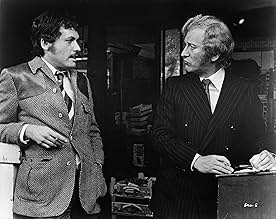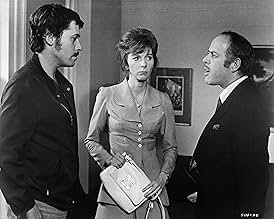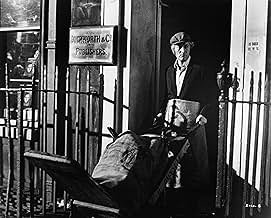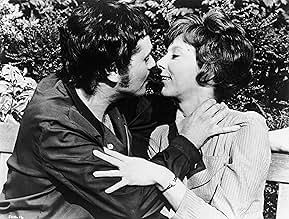Un serial killer sta strangolando le donne con una cravatta. La polizia di Londra ha un sospettato, ma è l'uomo sbagliato.Un serial killer sta strangolando le donne con una cravatta. La polizia di Londra ha un sospettato, ma è l'uomo sbagliato.Un serial killer sta strangolando le donne con una cravatta. La polizia di Londra ha un sospettato, ma è l'uomo sbagliato.
- Regia
- Sceneggiatura
- Star
- Premi
- 3 vittorie e 8 candidature totali
Recensioni in evidenza
The grand man of suspense, Alfred Hitchcock, directs this dark film about a man that kills women with neckties with relish, aplomb, and an atypical grimness. The story is typical Hitch as an innocent man is pushed into a world of intrigue around him as everyone believes him to be the necktie killer. Jon Finch plays the innocent with earnestness and is quite good in his role. The rest of the cast is very effective as well. Hithcock, however, is the real star with his camera. Although much of the film is nothing more than tried and true material, Alfred Hitchcock makes the mundane spectacular with his camera and some great shots and spaces of silence. The scene where a girl coming back from lunch is awesome as we the audience are made to wait what seems an eternity for her to discover what has taken place since she left. The scene of the camera moving in and out of the house of the killer is also wonderful, as is the scene with the killer in the potato truck. That scene is easily the most suspenseful of the entire film. The film is particularly dark for Hitchcock as a women is raped rather abruptly(for lack of a better word) showing naked breasts and genuine terror. To counter-balance the more lurid aspects of the film is a subplot story of a police inspector, played with charm by Alec McCowen, whose wife constantly feeds him nothing but gourmet meals that sound and look quite horrible! These scenes are so funny and charming! A good thriller from the master of suspense!
Hitchcock did one hell of a job! I was planning on watching this movie just for about 30 minutes before going to sleep and was gonna finish watching it the next day, but instead I was so engaged that I couldn't stop watching and stayed awake the whole 2 hours. I loved the irony of the actual rapist having no clues pointing to him and the innocent man having all clues pointing to him. The scene involving the rapist in the back of the truck, rummaging through a sack of potatoes (and that's all I'll reveal) is classic suspense. I also loved how Hitchcock left the rape scenes (excluding the first one) up to the imagination. There is a great shot where one of the victims is being raped and we don't even hear any off-screen yells or screams. The camera simply tracks backwards down a staircase and out the front door, where people walk by minding their own business, ignorant to the evil that's being committed a floor above. Any amateurish director would've went for true shock value and showed all the rape scenes in explicit detail. We don't call Hitchcock the master of suspense for nothing. The scene is still quite haunting. In horror and suspense, what you don't see can be a lot more frightening than what you do see, since the imagination is a powerful thing. The last line of the movie should go down in history. It had me bawling with laughter! Just that one line gave perfect closure to this wonderful film.
My score: 8 (out of 10)
My score: 8 (out of 10)
After 30 years in the USA and after the disappointments of "Torn Curtain" (1966) and "Topaz" (1969), Alfred Hitchcock came back to his native Britain for this film -written by Anthony Shaffer from a novel by Arthur La Bern.
"Frenzy" is his penultimate movie, certainly the best one of his last period. The way the Master films is very classic -deliberately old fashioned; at the same time all the charachters are very modern -they belong to a more and more decadent and neurotic London.
Almost from the beginning we know who the criminal is, and Hitchcock enjoys himself in showing how the man tries to escape and how he betrays people. Director's trademarks are also back in force: suspense (a lot!) and humour -more sarcastic and sharper than ever.
For "Frenzy" the Master doesn't get movie stars, instead he chooses local stage actors. In my opinion he does this because, first, he wants the film to be very English. Furthermore, he wants this time more ordinary faces for making the story more shocking (with famous actors in the main roles, the plot -in a certain way- could be identified mostly with them and loose strength, instead Hitchcock avoids that "paradox"...).
Maybe "Frenzy" is not an unforgettable masterpiece like "Psycho", "Vertigo", "Birds" or many other works. But it is a great movie indeed.
"Frenzy" is his penultimate movie, certainly the best one of his last period. The way the Master films is very classic -deliberately old fashioned; at the same time all the charachters are very modern -they belong to a more and more decadent and neurotic London.
Almost from the beginning we know who the criminal is, and Hitchcock enjoys himself in showing how the man tries to escape and how he betrays people. Director's trademarks are also back in force: suspense (a lot!) and humour -more sarcastic and sharper than ever.
For "Frenzy" the Master doesn't get movie stars, instead he chooses local stage actors. In my opinion he does this because, first, he wants the film to be very English. Furthermore, he wants this time more ordinary faces for making the story more shocking (with famous actors in the main roles, the plot -in a certain way- could be identified mostly with them and loose strength, instead Hitchcock avoids that "paradox"...).
Maybe "Frenzy" is not an unforgettable masterpiece like "Psycho", "Vertigo", "Birds" or many other works. But it is a great movie indeed.
A good return to form for the master of suspense, Alfred Hitchcock. Since The Birds in 1963 Hitchcock's movies (Marnie, Torn Curtain and Topaz) had not met with commercial success (though, personally, I think Marnie was great).
Frenzy sees Hitchcock back to doing what he does best - suspenseful murder dramas. Great, intriguing plot with the usual clever direction from Hitchcock. Some of his camera angles and exterior shots are straight from his own book of how imply something and create tension without saying a word, or using manipulative music.
The movie also has some great comedic moments. The Chief Inspector and his wife having dinner were always hilarious.
Much more edgy in terms of nudity and sex than any previous Hitchcock movies. This could be ascribed to censorship restrictions being relaxed. Also tells you what Hitchcock could have done with is movies if all the stupid, puritanical censorship wasn't there all along.
Not as tightly wound as his greats (Rear Window and Psycho especially), so not perfect as far as suspense and enthrallment goes.
Good performance by Jon Finch in the lead role. Good support from Alec McCowen, Barry Foster, Anna Massey and Barbara Leigh-Hunt.
Sadly, this was to be Hitchcock's penultimate movie. His final movie, Family Plot was released four years later, in 1976. He died in 1980.
Frenzy sees Hitchcock back to doing what he does best - suspenseful murder dramas. Great, intriguing plot with the usual clever direction from Hitchcock. Some of his camera angles and exterior shots are straight from his own book of how imply something and create tension without saying a word, or using manipulative music.
The movie also has some great comedic moments. The Chief Inspector and his wife having dinner were always hilarious.
Much more edgy in terms of nudity and sex than any previous Hitchcock movies. This could be ascribed to censorship restrictions being relaxed. Also tells you what Hitchcock could have done with is movies if all the stupid, puritanical censorship wasn't there all along.
Not as tightly wound as his greats (Rear Window and Psycho especially), so not perfect as far as suspense and enthrallment goes.
Good performance by Jon Finch in the lead role. Good support from Alec McCowen, Barry Foster, Anna Massey and Barbara Leigh-Hunt.
Sadly, this was to be Hitchcock's penultimate movie. His final movie, Family Plot was released four years later, in 1976. He died in 1980.
After the poorly received Torn Curtain and Topaz, Hitchcock returned home to both the murder genre and to Covent Gardens in London to film Frenzy, a lurid tale of a serial killer and the man caught up as the prime suspect. The only feeling of new from the film comes from the use of nudity and a particular focus on the real killer, and yet it's still a solidly built thriller, the sort of thing that Hitchcock could seemingly do in his sleep.
There's a killer on the loose in London, and he has a trademark in that he rapes his female victims and then strangles them with a necktie. In the city is Dick, a former RAF pilot who's had a hard time of it since he left the service, going from job to job and recently divorced. He starts the movie by taking a drink from the pub where he works and immediately getting fired despite his protestations, and the support of his girlfriend Babs, that he was going to pay for it. Without a job, Dick goes to his ex-wife for some kind of support, which he gets through dinner and twenty pounds that she slips into his pocket without his knowledge.
Later, Dick's friend Rusk shows up to Dick's wife's office, a matchmaking service, and demonstrates for the audience, in rather shocking detail, how he is the necktie killer. Now, the reveal of the identity of the serial killer is an interesting twist on the genre. We see Dick and Rusk interacting at several points, events that tell the audience of the danger Dick is putting himself into while he doesn't realize it himself. It's a new version of the tried and true method of creating tension. The other interesting thing about the early reveal is that about half of the movie is from Rusk's own perspective, including the movie's best single sequence.
Rusk has murdered another girl and shoved her body into a potato sack onto a truck. As he returns to his apartment, he realizes that he's lost his pin and that the girl had grabbed onto it. He needs to get back to the body and retrieve the pin, but as he's hiding in the back of the truck, the driver comes and drives off. Rusk has to negotiate the logistics of hiding in the back of a potato truck while digging out a corpse, breaking the fingers on the right hand because of rigor mortis, retrieving the pin, and then getting out again. I can imagine Hitchcock laughing himself silly as he conceived of the scene (not shooting, it seemed like a nightmare to shoot). It's such a twist on the sort of sequence where the bad guy, who's already done the bad dead, is trying to get out of trouble, and the filmmaking is so effective that the audience is along with him, not really cheering him on, but instinctively sharing the same concerns as him.
Another wonderfully amusing aspect of the film, which feels a little disassociated from the rest and gives some pause in terms of praise, is the chief inspector on the case and his wife. The film uses two dinners as springboards for the inspector to explain the police's position at two different points in the film, and instead of just straight exposition the scenes are played out as the wife brings out the most bizarre dishes that look completely inedible. However, since the police inspector is such a polite British man of good manners, he finds ways to get around eating the food he obviously has great distaste for, one of which made my wife cringe audibly as he did it. They're two of the most purely entertaining scenes of exposition in Hitchcock's filmography.
So, yeah, I like it. I do feel like it's a return to form after Topaz, though I seem to like Torn Curtain more than most so it's not like some sort of great gap of quality. One of the drawbacks of the film's approach to treating the two characters, the criminal and the falsely accused, with equal measure is that they end up a bit thinner than they otherwise could be. Dick, in particular, feels like a generic Hitchcock protagonist rather than a strongly written character, especially after the first act when the focus on the actual crimes gets taken up.
It's a gripping little murder thriller set in Alfred Hitchcock's old stomping grounds with some wonderful sequences. It seems to have been a bit overpraised contemporaneously, but that doesn't detract from the fact that it's still a solidly good film.
There's a killer on the loose in London, and he has a trademark in that he rapes his female victims and then strangles them with a necktie. In the city is Dick, a former RAF pilot who's had a hard time of it since he left the service, going from job to job and recently divorced. He starts the movie by taking a drink from the pub where he works and immediately getting fired despite his protestations, and the support of his girlfriend Babs, that he was going to pay for it. Without a job, Dick goes to his ex-wife for some kind of support, which he gets through dinner and twenty pounds that she slips into his pocket without his knowledge.
Later, Dick's friend Rusk shows up to Dick's wife's office, a matchmaking service, and demonstrates for the audience, in rather shocking detail, how he is the necktie killer. Now, the reveal of the identity of the serial killer is an interesting twist on the genre. We see Dick and Rusk interacting at several points, events that tell the audience of the danger Dick is putting himself into while he doesn't realize it himself. It's a new version of the tried and true method of creating tension. The other interesting thing about the early reveal is that about half of the movie is from Rusk's own perspective, including the movie's best single sequence.
Rusk has murdered another girl and shoved her body into a potato sack onto a truck. As he returns to his apartment, he realizes that he's lost his pin and that the girl had grabbed onto it. He needs to get back to the body and retrieve the pin, but as he's hiding in the back of the truck, the driver comes and drives off. Rusk has to negotiate the logistics of hiding in the back of a potato truck while digging out a corpse, breaking the fingers on the right hand because of rigor mortis, retrieving the pin, and then getting out again. I can imagine Hitchcock laughing himself silly as he conceived of the scene (not shooting, it seemed like a nightmare to shoot). It's such a twist on the sort of sequence where the bad guy, who's already done the bad dead, is trying to get out of trouble, and the filmmaking is so effective that the audience is along with him, not really cheering him on, but instinctively sharing the same concerns as him.
Another wonderfully amusing aspect of the film, which feels a little disassociated from the rest and gives some pause in terms of praise, is the chief inspector on the case and his wife. The film uses two dinners as springboards for the inspector to explain the police's position at two different points in the film, and instead of just straight exposition the scenes are played out as the wife brings out the most bizarre dishes that look completely inedible. However, since the police inspector is such a polite British man of good manners, he finds ways to get around eating the food he obviously has great distaste for, one of which made my wife cringe audibly as he did it. They're two of the most purely entertaining scenes of exposition in Hitchcock's filmography.
So, yeah, I like it. I do feel like it's a return to form after Topaz, though I seem to like Torn Curtain more than most so it's not like some sort of great gap of quality. One of the drawbacks of the film's approach to treating the two characters, the criminal and the falsely accused, with equal measure is that they end up a bit thinner than they otherwise could be. Dick, in particular, feels like a generic Hitchcock protagonist rather than a strongly written character, especially after the first act when the focus on the actual crimes gets taken up.
It's a gripping little murder thriller set in Alfred Hitchcock's old stomping grounds with some wonderful sequences. It seems to have been a bit overpraised contemporaneously, but that doesn't detract from the fact that it's still a solidly good film.
Lo sapevi?
- QuizAlfred Hitchcock originally planned to do his cameo as the body floating in the river. A dummy was even constructed to do the shot. The plans were changed and a female body, a victim of the Necktie Murderer, was used instead. Hitchcock instead became one of the members of the crowd who are listening to the speaker on the river bank. The dummy of Hitchcock was used in the typically humorous trailer hosted by Hitchcock.
- BlooperWhen examining the murder scene at the marriage bureau, a police officer brings the victim's handbag out to Inspector Oxford, who correctly holds it with a handkerchief to keep his fingerprints from contaminating the evidence. He then he sticks his ungloved hand inside and feels around, thus contaminating it with his own fingerprints.
- Citazioni
[last lines]
Chief Inspector Oxford: Mr. Rusk, you're not wearing your tie.
[Robert Rusk is speechless for a moment]
Robert Rusk: I...
[he drops the trunk that he has just dragged into the room]
- Curiosità sui creditiThe Universal Pictures logo does not appear on this film.
- Versioni alternativeThe original UK cinema and initial 1989 CIC video releases were cut by 19 secs by the BBFC to remove shots of underwear removal and closeups of neck strangling from the murder scene. The cuts were restored in all later Universal video and DVD releases.
- ConnessioniFeatured in The Dick Cavett Show: Alfred Hitchcock (1972)
I più visti
Accedi per valutare e creare un elenco di titoli salvati per ottenere consigli personalizzati
- How long is Frenzy?Powered by Alexa
- Where can I find screenshots from this film?
Dettagli
- Data di uscita
- Paese di origine
- Lingua
- Celebre anche come
- Frenesí
- Luoghi delle riprese
- The Globe pub, Bow Street, Covent Garden, Londra, Inghilterra, Regno Unito(pub where Blaney, Babs and Forsythe work)
- Azienda produttrice
- Vedi altri crediti dell’azienda su IMDbPro
Botteghino
- Budget
- 2.000.000 USD (previsto)
- Lordo in tutto il mondo
- 4940 USD
- Tempo di esecuzione1 ora 56 minuti
- Proporzioni
- 1.85 : 1
Contribuisci a questa pagina
Suggerisci una modifica o aggiungi i contenuti mancanti




































